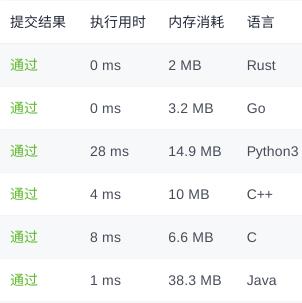算法1365. 有多少小于当前数字的数字(java / c / c++ / python / go / rust)
Posted 二当家的白帽子
tags:
篇首语:本文由小常识网(cha138.com)小编为大家整理,主要介绍了算法1365. 有多少小于当前数字的数字(java / c / c++ / python / go / rust)相关的知识,希望对你有一定的参考价值。
文章目录
- 1365. 有多少小于当前数字的数字:
- 样例 1:
- 样例 2:
- 样例 3:
- 提示:
- 分析
- 题解
- 原题传送门:https://leetcode-cn.com/problems/how-many-numbers-are-smaller-than-the-current-number/
1365. 有多少小于当前数字的数字:
给你一个数组 nums,对于其中每个元素 nums[i],请你统计数组中比它小的所有数字的数目。
换而言之,对于每个 nums[i] 你必须计算出有效的 j 的数量,其中 j 满足 j != i 且 nums[j] < nums[i] 。
以数组形式返回答案。
样例 1:
输入:
nums = [8,1,2,2,3]
输出:
[4,0,1,1,3]
解释:
对于 nums[0]=8 存在四个比它小的数字:(1,2,2 和 3)。
对于 nums[1]=1 不存在比它小的数字。
对于 nums[2]=2 存在一个比它小的数字:(1)。
对于 nums[3]=2 存在一个比它小的数字:(1)。
对于 nums[4]=3 存在三个比它小的数字:(1,2 和 2)。
样例 2:
输入:
nums = [6,5,4,8]
输出:
[2,1,0,3]
样例 3:
输入:
nums = [7,7,7,7]
输出:
[0,0,0,0]
提示:
- 2 <= nums.length <= 500
- 0 <= nums[i] <= 100
分析
- 面对这道算法题目,我陷入了沉思。
- 如果直接暴力硬解,那需要每个数字都遍历整个数组,时间复杂度O(n2),太慢了。
- 提示中已经给了数组中数字的范围是 [0, 100] 。我们可以直接先统计出每个数字的个数,然后再统计出小于等于每个数字的个数,最后再遍历数组利用之前的统计返回结果。
- 注意 [0, 100] 一共是101个数。
题解
java
class Solution
public int[] smallerNumbersThanCurrent(int[] nums)
int[] counter = new int[101];
for (int num : nums)
counter[num]++;
for (int i = 1; i <= 100; ++i)
counter[i] += counter[i - 1];
int n = nums.length;
int[] ans = new int[n];
for (int i = 0; i < n; ++i)
if (nums[i] > 0)
ans[i] = counter[nums[i] - 1];
return ans;
c
/**
* Note: The returned array must be malloced, assume caller calls free().
*/
int* smallerNumbersThanCurrent(int* nums, int numsSize, int* returnSize)
int counter[101];
memset(counter, 0, sizeof(counter));
for (int i = 0; i < numsSize; ++i)
counter[nums[i]]++;
for (int i = 1; i <= 100; ++i)
counter[i] += counter[i - 1];
*returnSize = numsSize;
int *ans = malloc(numsSize * sizeof(int));
for (int i = 0; i < numsSize; ++i)
ans[i] = nums[i] == 0 ? 0 : counter[nums[i] - 1];
return ans;
c++
class Solution
public:
vector<int> smallerNumbersThanCurrent(vector<int>& nums)
vector<int> counter(101, 0);
int n = nums.size();
for (int &num: nums)
counter[num]++;
for (int i = 1; i <= 100; ++i)
counter[i] += counter[i - 1];
vector<int> ans;
for (int &num: nums)
ans.push_back(num == 0 ? 0 : counter[num - 1]);
return ans;
;
python
class Solution:
def smallerNumbersThanCurrent(self, nums: List[int]) -> List[int]:
counter = [0] * 101
for num in nums:
counter[num] += 1
for i in range(1, 101):
counter[i] += counter[i - 1]
ans = []
for num in nums:
ans.append(0 if num == 0 else counter[num - 1])
return ans
go
func smallerNumbersThanCurrent(nums []int) []int
counter := [101]int
for _, num := range nums
counter[num]++
for i := 1; i <= 100; i++
counter[i] += counter[i-1]
ans := make([]int, len(nums))
for i, num := range nums
if num > 0
ans[i] = counter[num-1]
return ans
rust
impl Solution
pub fn smaller_numbers_than_current(nums: Vec<i32>) -> Vec<i32>
let mut counter = vec![0; 101];
nums.iter().for_each(|&num|
counter[num as usize] += 1;
);
(1..101).for_each(|i|
counter[i] += counter[i - 1];
);
nums.iter().map(|&num|
if num == 0
0
else
counter[num as usize - 1]
).collect()

原题传送门:https://leetcode-cn.com/problems/how-many-numbers-are-smaller-than-the-current-number/
非常感谢你阅读本文~
欢迎【👍点赞】【⭐收藏】【📝评论】~
放弃不难,但坚持一定很酷~
希望我们大家都能每天进步一点点~
本文由 二当家的白帽子:https://le-yi.blog.csdn.net/ 博客原创~
以上是关于算法1365. 有多少小于当前数字的数字(java / c / c++ / python / go / rust)的主要内容,如果未能解决你的问题,请参考以下文章